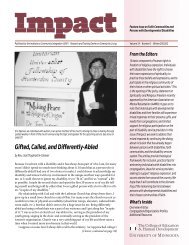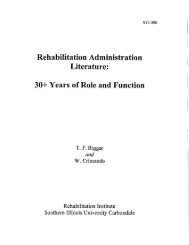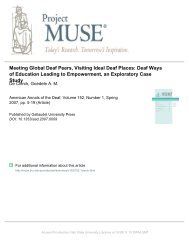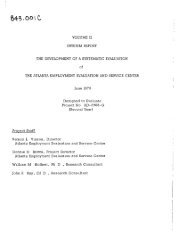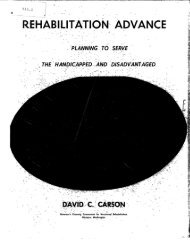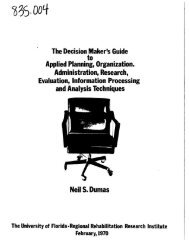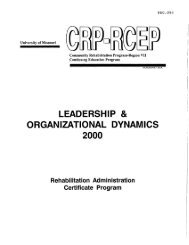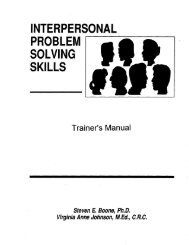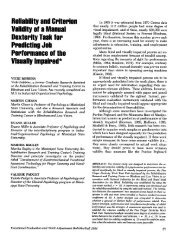by requirements for the degree of (Education) - NCRTM
by requirements for the degree of (Education) - NCRTM
by requirements for the degree of (Education) - NCRTM
Create successful ePaper yourself
Turn your PDF publications into a flip-book with our unique Google optimized e-Paper software.
communities selected included one large city, two la.rge towns, two smaller<br />
towns, and two or three rural communities. Personal interviews were con-<br />
ducted with over 200 prospective employers, ranging from <strong>the</strong> one-man shop<br />
owaer to <strong>the</strong> personnel manager <strong>of</strong> chain stores. Results indicated that<br />
<strong>the</strong>re were some job possibilities <strong>for</strong> EMR's in eac community. Most <strong>of</strong><br />
<strong>the</strong> opportunities were in <strong>the</strong> field <strong>of</strong> unskilled labor, were seasonal, had<br />
few fringe benefits, and lacked economic security fo <strong>the</strong> future. Job<br />
opportunities were me.ager in some communities due to economic conditions<br />
within <strong>the</strong> area, misunderstanding <strong>of</strong> <strong>the</strong> terms "mentally retarded" and<br />
"mentally ill;" a lack <strong>of</strong> understanding <strong>of</strong> <strong>the</strong> meaning and implications<br />
<strong>of</strong> <strong>the</strong> term "mentally retarded," a lack <strong>of</strong> interest in <strong>the</strong> MR, or a pre-<br />
vious unhappy experience with a mentally retarded employee. Baldwin recom-<br />
mended that preparation <strong>of</strong> <strong>the</strong> MR <strong>for</strong> employment should begin in childhood<br />
'with emphasis placed on <strong>the</strong> development <strong>of</strong> good personal, social and busi-<br />
ness habits along with basic academic skills.<br />
Goldstein (1964) states that community attitudes are an essential<br />
area to consider when attempting to predict successful outcome <strong>for</strong> <strong>the</strong><br />
retarded.<br />
Follow-up studies undertaken <strong>by</strong> Fairbanks (1933), Ballet (1936), and<br />
Kennedy (1948) on <strong>the</strong> employment <strong>of</strong> <strong>the</strong> educable mentally retarded reveal<br />
that when <strong>the</strong>re is ashortage <strong>of</strong> manpower <strong>the</strong> job opportunities <strong>for</strong> <strong>the</strong><br />
retarded compare faivorably with those <strong>of</strong> <strong>the</strong> normal worker. However, in<br />
periods o high unemployment <strong>the</strong> retarded are adversely affected <strong>by</strong> <strong>the</strong><br />
competition <strong>for</strong> jobs.<br />
The vocational success <strong>of</strong> <strong>the</strong> retarded may be influenced <strong>by</strong> <strong>the</strong><br />
following situational (non-subject) variables<br />
i) The relationship between student and his supervisor or instructor;<br />
35



